The Inklings, Part 1 – News And Tidbits
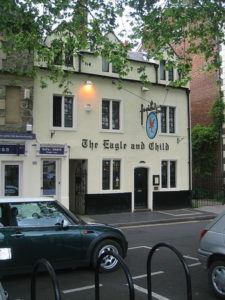 My recent series based on J. R. R. Tolkien’s lengthy essay “On Fairy-Stories” has renewed my interest in the group of scholars and writers known as the Inklings who famously met in the Oxford pub The Eagle and Child. Hence I’d like to do a bit more investigation about the group, the individuals, their writing, and the legacy of their work. Consider this a sort of introduction to this new series.
My recent series based on J. R. R. Tolkien’s lengthy essay “On Fairy-Stories” has renewed my interest in the group of scholars and writers known as the Inklings who famously met in the Oxford pub The Eagle and Child. Hence I’d like to do a bit more investigation about the group, the individuals, their writing, and the legacy of their work. Consider this a sort of introduction to this new series.
News
You may or may not know that C. S. Lewis has an online presence, thanks to a variety of sources — scholarly organizations, the publisher reissuing his books, his family. One such site is Books by C. S. Lewis, a blog put out by HarperOne. Their official statement:
This blog, officially part of HarperOne’s CSLewis.com, offers original work on and about C. S. Lewis from scholars who have written far and wide about his stories, his theology, and his world. We are in line to add new entries every few weeks and we encourage your comments and feedback as we develop this resource.
Also put out by HarperOne is the Official C. S. Lewis Facebook page and (believe it or not) Twitter account.
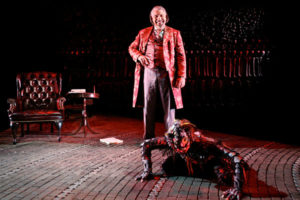 From the blog I learned more about something I recently heard on the radio — there is a stage play of The Screwtape Letters that will be produced throughout the country this year, starting in Los Angeles (Jan. 14-15). For more details and the dates of the production nearest you, visit the Screwtape Letters theater site.
From the blog I learned more about something I recently heard on the radio — there is a stage play of The Screwtape Letters that will be produced throughout the country this year, starting in Los Angeles (Jan. 14-15). For more details and the dates of the production nearest you, visit the Screwtape Letters theater site.
I also learned about a scholarly journal published by the Wade Center at Wheaton College entitled Seven in honor of the seven writers and thinkers often referred to as the Inklings. In the latest volume, you’ll find two essays, accessible online, about George MacDonald by G. K. Chesterton — “George Macdonald and His work” and “George Macdonald”:
Perhaps because George MacDonald rapidly lost popularity at the beginning of the twentieth century, these two essays by Chesterton were never reprinted and have been somewhat forgotten.
From the Facebook page, I learned about special sales prices of two well-loved C. S. Lewis titles:
Throughout January the e-book versions of The Screwtape Letters and The Great Divorce are being offered at special promotional prices.
Tidbits
 This section enumerates odds and ends, primarily about Owen Barfield, I learned in my exploration for this introduction to the series on the Inklings. Perhaps I’m the only one who didn’t already know these items.
This section enumerates odds and ends, primarily about Owen Barfield, I learned in my exploration for this introduction to the series on the Inklings. Perhaps I’m the only one who didn’t already know these items.
Barfield wrote very little fiction, though his first book was a children’s fantasy, The Silver Trumpet.
His first name was Arthur.
He lived to be 100, passing away in 1997. He has thus received the tag as the first and last Inkling.
He and his wife adopted three children, Alexander, Lucy, and Geoffrey, and it was to Lucy that C. S. Lewis dedicated The Lion, the Witch, and the Wardrobe. He also dedicated The Voyage of the Dawn Treader to Geoffrey.
Barfield had a huge impact on C. S. Lewis who called him “the best and wisest of my unofficial teachers”.
His grandson, Owen A. Barfield, heads up the Owen Barfield Literary Estate which owns the copyright to all his works.
He wrote some poetry and fiction under the pseudonym G. A. L. Burgeon.
C. S. Lewis also used a pseudonym, in fact more than one. He wrote on occasion as Clive Hamilton and as N. W. Clerk.
So what are your thoughts or questions about the Inklings? Which one do you know the least? Have you read works by any of them besides Lewis and Tolkien? Who is your favorite Inkling and why? I anticipate learning a lot more about this group than I’ve known before.































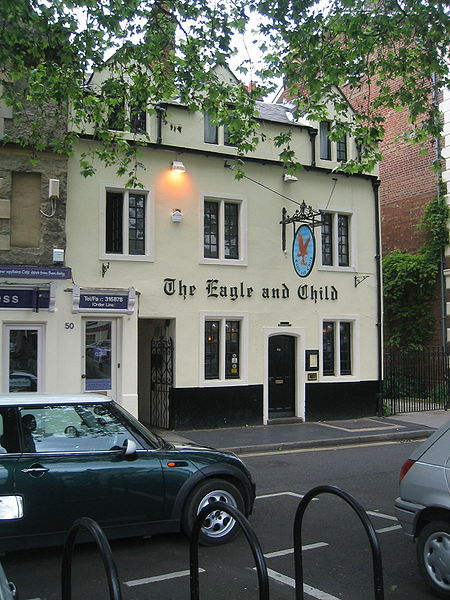


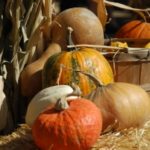
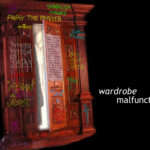



There is the Mythopoeic Society for those with a scholarly interest in the Inklings as well as in their fiction.
Sherwood, I’m familiar with the Mythopoeic Society. Some while ago, I ordered their yearly publication (or semi-annual; I forget now) and was frankly disappointed with the quality — both the production (photocopied and stapled together) and the content. I was invited to a meeting but never attended. Perhaps they’ve made strides since. It sounds like such an attractive organization and I was really considering submitting some work for publication because I thought it would be a prestigious publishing credit even though they didn’t pay.
What has your experience with them been like?
Becky
The name that comes to mind–pretty sure he’s an Inkling–is Rodge Lancelyn Green, who gave the Narnia series its name. I have a book of Arthurian legends written by him.
Galadriel, one of the things I want to do in this series is learn more about the less famous members. I already know that the membership was more fluid than we are prone to think. Roger Lancelyn Green is not one of the seven the Ward Center focuses on, but I discovered their journal is geared toward those whose works are represented in their collection. So apparently they have nothing of Green’s.
All that to say, yes, he was an Inklings member though you won’t find articles about him in Seven. He’s one I’d like to become more familiar with — children’s fantasy, and even one compared favorable to Narnia.
Becky
Was Dorothy Sayers one of the Inklings? I have that tidbit lodged in my brain and I’m not sure if it’s true.
I highly enjoy her Peter Wimsey mysteries as adapted by the BBC, but I just can’t handle her writing. It’s all dialogue and hardly any narrative. I find myself panting for breath after two pages. :-p
Kessie, I don’t think she was an original member of the informal “club” — which was all a bunch of British professor males — but she was their contemporary. Lewis quotes Sayers, and was a friend, and I believe he was a fan of much of her work.
Actually Dorothy Sayers is listed as one of the Seven. They actually were a fluid bunch, so I was surprised to learn that the Wade Center had identified seven they considered The Inklings.
Interesting. I would have thought she didn’t count, as I can’t see her there in the back room at The Eagle and Child, having pints, drinking and, and and and smokin’!
One of the articles in the most recent volume of Seven is about her: “Dorothy L. Sayers and the Somersham Pageant of 1908” by Martin Ferguson Smith.
I discovered how they made their determination who to include in their list of Inklings: “Our desire is to provide a public forum for academic investigation of a variety of issues pertaining to the lives and works of the seven authors represented in the Wade Center’s collection.” [Emphasis mine.]
Becky
Kessie, I fell in love with the BBC Peter Wimsey series too! But I’ve never read one of Dorthy Sayers’ books. My church library even has copies, but I’ve never made it a priority. Maybe this series will get me moving.
I already read some Chesterton because of Spec Faith visitors urging me to it, so we’ll see. 😉
Becky
Kessie, perhaps try “The Nine Taylors,” a Wimsey mystery that can stand alone. I’ve read and read it, and seen it produced.
She’s most famous in literary circles for her translation of The Divine Comedy. She also wrote liturgical plays. She was a fascinating Christian. The only kind of thing she wrote that I didn’t like was her theological works.
Pretty sure she wasn’t an Inkling. Becky, do you know?
Marie, because Sayers is one of the seven listed in the Wade Center Inklings collection that prompted their literary journal, I assumed she was, but I’ll check into it some more. As I said earlier, the group was quite fluid — members coming and going, so it’s possible she was for a time. I’ll see what I can learn.
Becky
Hi Rebecca,
I have two books I’d like to recommend.
One is “The Inklings at Oxford: a tour of the Inklings sites in and around Oxford: http://www.amazon.com/Inklings-Oxford-Lewis-Tolkien-Friends/dp/0310285038
The other is Lewis’ last book, “A Discarded Image. An Introduction to Medieval and Rennaisance Literature.” http://www.amazon.com/Discarded-Image-Introduction-Renaissance-Literature/dp/0521477352
In this work Lewis describes what he calls the “Medieval Model” a view of man and the universe found in Medieval and Renaissance literature. When you hear a professor of Medieval literature recommend the novels of Lewis or Tolkien as a good introduction to Medieval literature for modern readers, it is the elements of the “Medieval Model” found in these tales that they are referring to.
Just as Joseph Campbell’s “The Hero with a Thousand Faces” shows the structure, the internal skeleton, of myths and epic stories, I really believe The Discarded Image is the key to understanding the visible; the skin and raiment, the texture and color of our favorite fantasy tales.
I’m writing a series of articles, on the elements of this model and how they appear in High Fantasy stories as a short course in Lewis’ theory. I’d be very interested in hearing your thoughts. http://theswordoffire.wordpress.com/
Regards,
Bill McGrath
Bill, thanks so much for this. I appreciate the recommendations and will definitely check out your posts. Looking forward to learning more about the Medieval Model.
And yes, what an interesting point, that two 20th century writers would be used to understand medieval literature. That speaks volumes right there.
Becky
Becky,
I love the supernatural novels of another Inkling, Charles Williams. He is known as a wonderful, wonderful poet who wrote on the Arthurian legends. All Hallows’ Eve may be his best known novel, and is one of my favorites. He was a mystic who belonged to an occult organization before coming to the Lord, and so his novels deal with the invisible things.
I love Lewis because he was not only a writer, teacher, thinker, apologist, and fabulous readable scholar, but a TALKER. I feel that we could easily talk to him. It seems like, although he dedicated books to particular children he knew, that he really wrote for all of us. Talking to Tolkien? I might argue with him, I feel–though I think he wrote such wonderful things, especially the tales in Silmarillion. And the poetry in LotR is superb.
I used to know more about the Inklings. For a while, I was associate editor of The Mythopoeic Society’s The Mythic Circle, a voluntary postion. This is probably the annual you purchased, Becky. One of the purposes of it, at that time, was to encourage and provide a place for novice fantasy writers; so, that may be why you were disappointed in the quality. Occasionally, there have been some very good poems, stories, and illustrations published in it. Like other fantasy writers, I had some of my first stories published in MC. It was someplace we could go.
The Society’s literary journal is of a higher quality. But you will find a lot of chaff there, and I decided that subscribing wasn’t what I wanted as a Christian writer/reader.
Maria, Charles Williams is another one of the Inklings I haven’t read. I’ve already learned so much from this quick look at the organization (mostly how much I don’t know).
What an amazing opportunity, for all those bright minds to talk and critique each other’s writing. Wouldn’t that have been fun, to be a fly on the wall during ther meetings.
I love your analysis of those three writers. Lewis, a talker. I’d not thought of him in that light before, but it makes sense.
Becky
Rebecca: the Society has a long history (I have been a member since I was sixteen, and I am sixty now) and its publications have varied in content and quality. Mythlore, the scholarly journal, is now edited by a professor, and juried as well.
The local meetings vary from group to group. The yearly gatherings are really wonderful if you like Inklings, fantasy, music, book talk, and the like! They are usually held on university campuses, all over the country.
Sherwood and Maria, thanks for setting me straight about the Mythopoeic Society. It’s good to hear from people who know from the inside. Unfortunate that my experience wasn’t positive. Up to that point I’d had a favorable view of the organization.
Becky